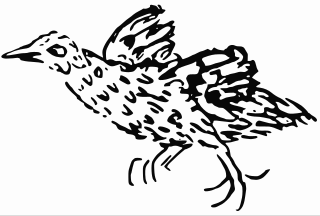 W
WThe Ascension crake is an extinct flightless bird that previously lived on Ascension Island in the South Atlantic Ocean. Like many other flightless birds on isolated islands, it was a rail. It was declared extinct by Groombridge in 1994; BirdLife International confirmed this in 2000 and 2004.
 W
WThe Saint Helena crake is an extinct bird species from the island of Saint Helena in the South Atlantic Ocean, one of two flightless rails which survived there until the early 16th century.
 W
WThe Flores monarch is a species of bird in the family Monarchidae. It is endemic to the western half of the island of Flores in Indonesia.
 W
WThe great Maui rail or great Maui crake is an extinct bird species from Maui, one of two flightless rails which survived on Maui until people arrived in 150 C.E.
 W
WThe Great Oʻahu crake or Great Oʻahu rail is an extinct bird species that was endemic to the island of Oʻahu in Hawaiʻi. It was one of two flightless rails that had survived on the island until the arrival of people in 200 C.E.
 W
WKaempfer's woodpecker, also known as the Piauí woodpecker, is a species of woodpecker from Brazil. The type specimen, a female, was collected in the Brazilian state of Piauí in 1926. No other individuals were collected or seen and the bird was feared extinct, until a male was captured by Advaldo Dias do Prado during mist netting in 2006 in the state of Tocantins. It was known as the Caatinga woodpecker for some time, but this name is misleading and based on confusion between two places with similar names.
 W
WThe Mascarene grey parakeet or Thirioux's grey parrot, is an extinct species of parrot which was endemic to the Mascarene Islands of Mauritius and Réunion in the western Indian Ocean. It has been classified as a member of the tribe Psittaculini, along with other parrots from the Islands.
 W
WNava's wren is a species of bird in the family Troglodytidae. It is endemic to Mexico.
 W
WTyto robusta was a prehistoric barn-owl. It lived at what is now Monte Gargano in Italy, and was an island throughout much of the Neogene when sea levels were higher. The owl's remains date back to the Miocene-Pliocene boundary 5.5 to 5 million years ago. The fossil bones are about 60% as long again as a modern barn owl, giving a total length of about 50–65 cm for T. robusta. This owl provides an interesting case study of evolution and insular gigantism.